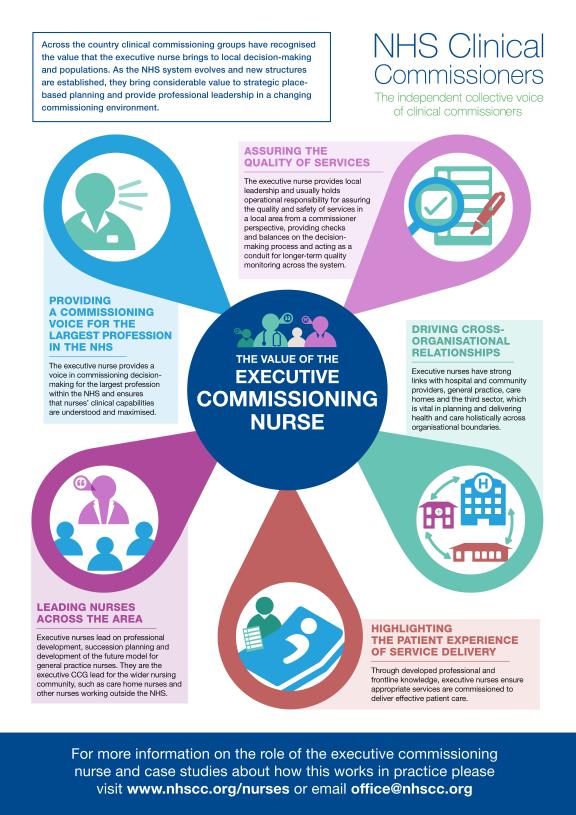The value of the executive commissioning nurse

Across the country clinical commissioning groups have recognised the value that the executive nurse brings to local decision-making and populations. As the NHS system evolves and new structures are established, they bring considerable value to strategic place-based planning and provide professional leadership in a changing commissioning environment.
NHS Clinical Commissioners (NHSCC) has launched an infographic that showcases the expertise and insight that executive commissioning nurses can bring for patients, populations and the system, which will be crucial to implementing patient centred care as the NHS moves towards integrated place-based planning. Members of the NHSCC Nurses’ Forum, the network that represents commissioning nurses, are concerned that variation in levels of nurse involvement in developing integrated systems across the country means that the NHS and patients may be missing out on the vital contribution that executive commissioning nurses can make for local areas.
Since their establishment in 2013, CCGs have been required to include a registered nurse on their governing body to expand the clinical knowledge and patient experience of the board. Many CCGs have expanded this role in recognition of the contribution that executive nurses embedded full-time in the day to day decision making of the CCG can make.
The infographic highlights five areas in which executive commissioning nurses bring value:
Assuring the quality of services – In local areas, although quality is the remit of the entire CCG board, when it comes to assurance of quality and engagement with ALBs on quality issues (e.g CQC) it is the nurse that holds this operational responsibility. At a board level they provide checks and balances on the decision-making process, which is becoming increasingly important with the relentless focus on cost and maintaining financial balance. They also monitor quality over the longer term, taking responsibility for identifying and addressing issues across systems.
Driving cross-organisational relationships – Through their quality assurance and leadership functions, executive commissioning nurses have strong links with hospital and community providers, general practice, care homes and the third sector. As local NHS systems begin to work more collaboratively to design services based on patient pathways rather than organisational silos, executive commissioning nurses can utilise their already existing networks to work across systems with colleagues in other sectors and ensure a coherent approach based on patient need.
Highlighting the patient experience of service delivery – The executive nurse ensures that the systems and processes are in place to deliver effective patient care, through developed professional and frontline knowledge. They understand the implications of commissioned pathways for patients and represent the profession that delivers care 24 hours a day.
Providing leadership for nurses across the local area – Executive commissioning nurses are the accepted professional lead for practice nurses in local areas, acting as their voice, leading on professional development and succession planning, as well as defining the future model for practice nursing as they contribute to local GP federations or clusters. They also represent the wider nursing community, such as care home nurses and other nurses working outside of the NHS, who provide a significant contribution to the wellbeing of local people. This professional leadership will be vital in the evolving NHS.
Providing a commissioning voice for the largest profession in the NHS – New approaches to address recognised population challenges will require innovative ways of working based on a multidisciplinary team. When planning services and systems, it is vital that all elements of the workforce are represented in the decision-making process, that their capabilities are understood, and that the resource is maximised. The executive nurse provides the voice for the largest profession within the NHS and offers an additional and alternate clinical perspective on strategic decision-making.
To coincide with the launch of the infographic the chair of the Nurses Forum, Lorna Collingwood-Burke, Chief Nursing Officer, NHS Northern, Eastern and Western (NEW) Devon CCG and NHS South Devon and Torbay CCG, highlighted how a failure to use the expertise of the executive commissioning nurse was a missed opportunity in a blog for the National Health Executive. Allison Cannon, Chief Nurse and Director of Quality, East Surrey and Sussex CCGs blogged in the Nursing Times about the importance of nursing leadership in integrated commissioning.



